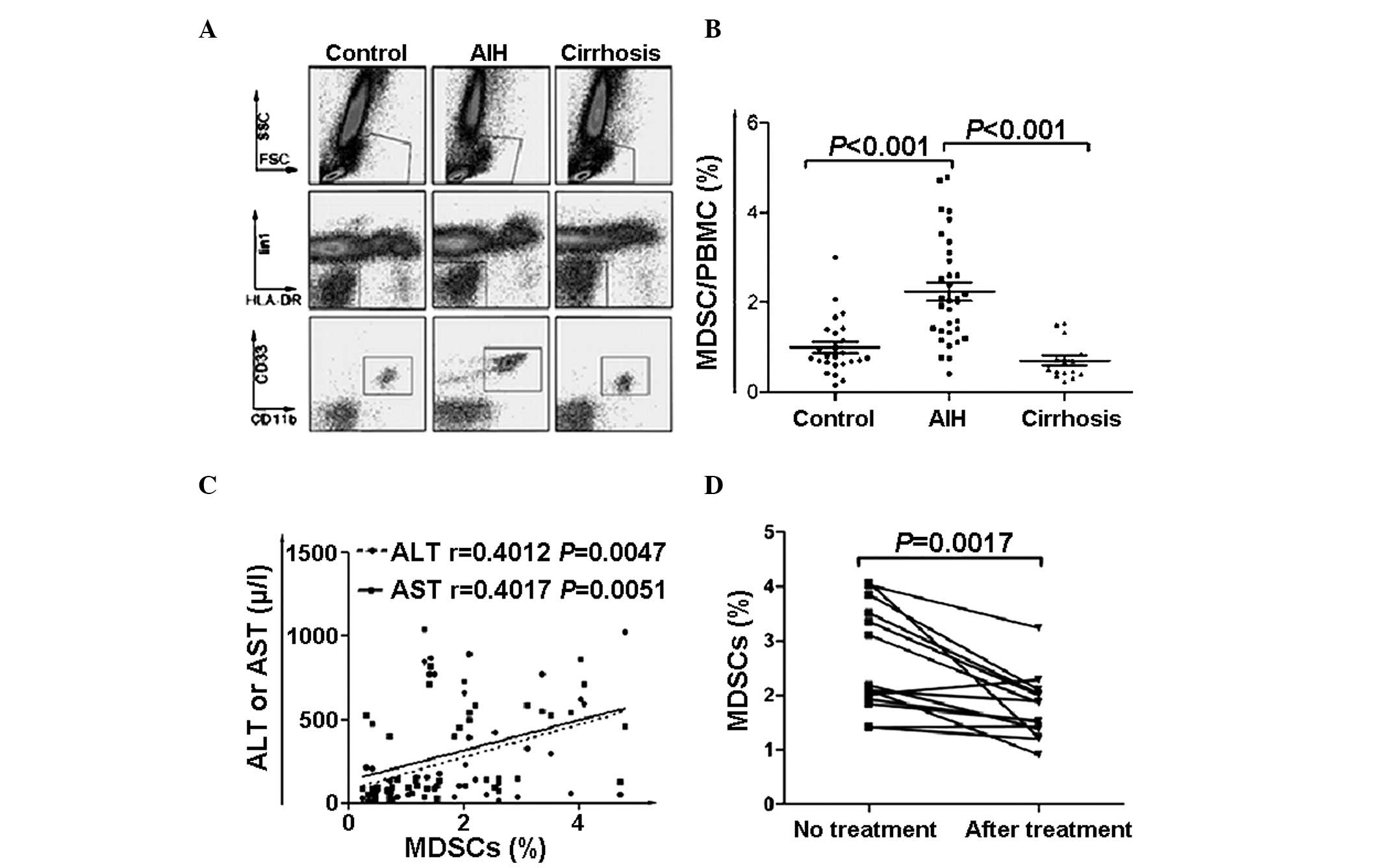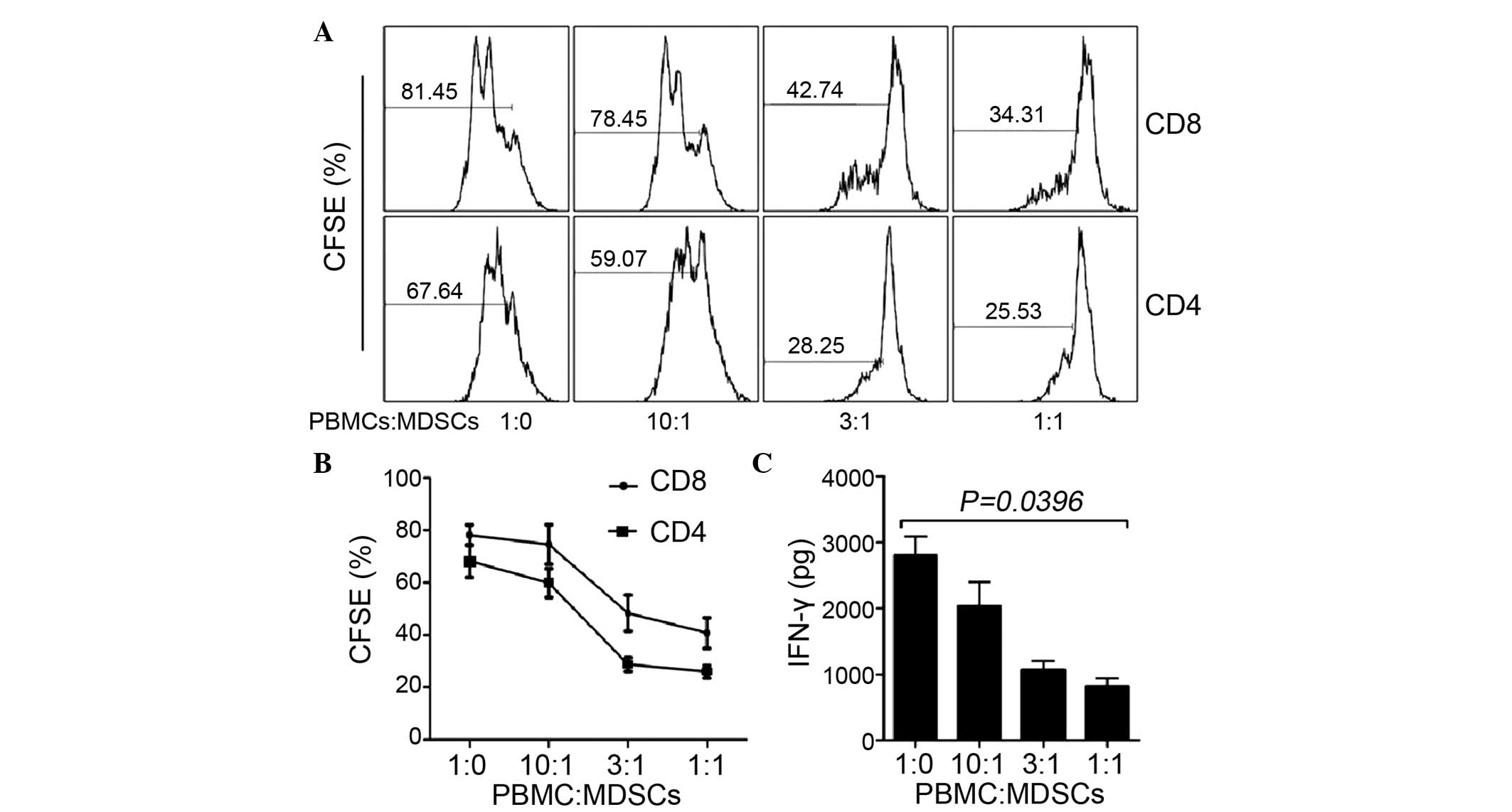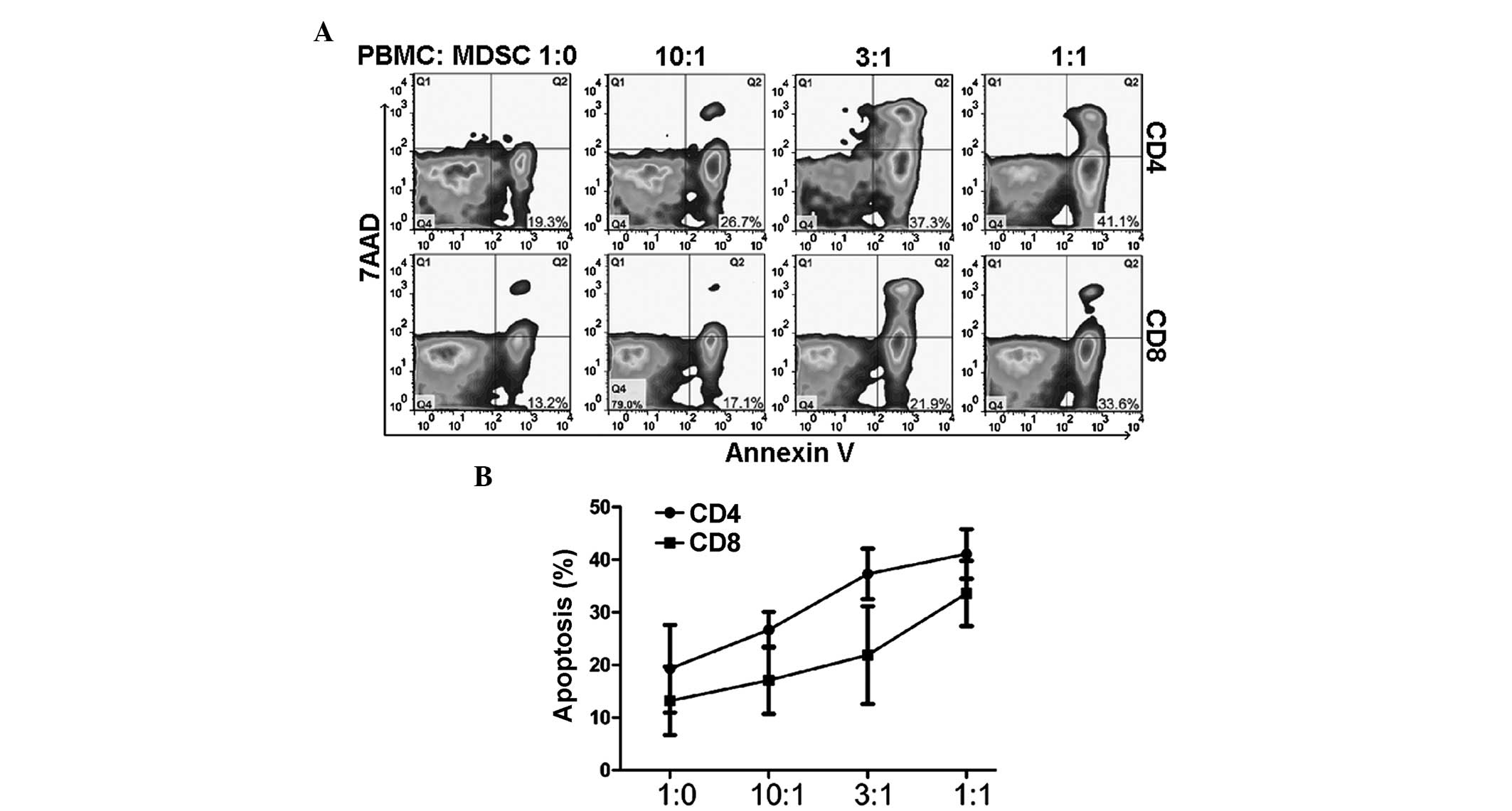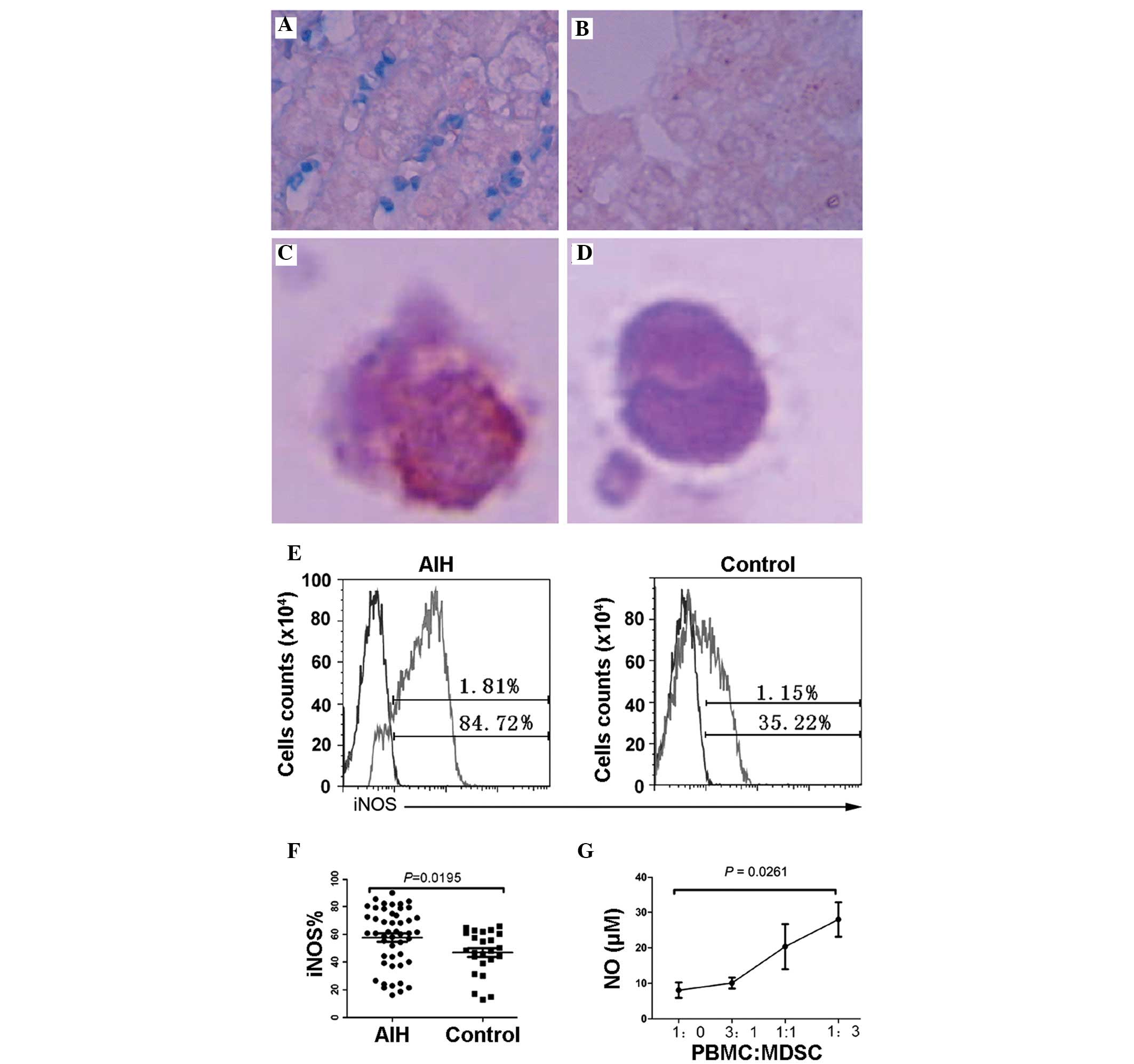|
1
|
Manns MP and Vogel A: Autoimmune
hepatitis, from mechanisms to therapy. Hepatology. 43(Suppl 2):
132–144. 2006. View Article : Google Scholar
|
|
2
|
Longhi MS, Ma Y, Mieli Vergani G and
Vergani D: Aetiopathogenesis of autoimmune hepatitis. J autoimmun.
34:7–14. 2010. View Article : Google Scholar
|
|
3
|
Longhi MS, Meda F, Wang P, Samyn M,
Mieli-Vergani G, Vergani D and Ma Y: Expansion and de novo
generation of potentially therapeutic regulatory T cells in
patients with autoimmune hepatitis. Hepatology. 47:581–591. 2008.
View Article : Google Scholar : PubMed/NCBI
|
|
4
|
Kawamura H, Aswad F, Minagawa M,
Govindarajan S and Dennert G: P2X7 receptors regulate NKT cells in
autoimmune hepatitis. J Immunol. 176:2152–2160. 2006. View Article : Google Scholar : PubMed/NCBI
|
|
5
|
Gabrilovich DI and Nagaraj S:
Myeloid-derived suppressor cells as regulators of the immune
system. Nat Rev Immunol. 9:162–174. 2009. View Article : Google Scholar : PubMed/NCBI
|
|
6
|
Peranzoni E, Zilio S, Marigo I, Dolcetti
L, Zanovello P, Mandruzzato S and Bronte V: Myeloid-derived
suppressor cell heterogeneity and subset definition. Curr Opin
Immunol. 22:238–244. 2010. View Article : Google Scholar : PubMed/NCBI
|
|
7
|
Solito S, Falisi E, Diaz-Montero CM, Doni
A, et al: A human promyelocytic-like population is responsible for
the immune suppression mediated by myeloid-derived suppressor
cells. Blood. 118:2254–2265. 2011. View Article : Google Scholar : PubMed/NCBI
|
|
8
|
Haile LA, von Wasielewski R,
Gamrekelashvili J, Krüger C, Bachmann O, Westendorf AM, et al:
Myeloid-derived suppressor cells in inflammatory bowel disease: a
new immunoregulatory pathway. Gastroenterology. 135:871–881.
881e1–e5. 2008. View Article : Google Scholar : PubMed/NCBI
|
|
9
|
Goh C, Narayanan S and Hahn YS:
Myeloid-derived suppressor cells: the dark knight or the joker in
viral infections? Immunol Rev. 255:210–221. 2013. View Article : Google Scholar : PubMed/NCBI
|
|
10
|
Ugel S, Delpozzo F, Desantis G, Papalini
F, Simonato F, Sonda N, et al: Therapeutic targeting of
myeloid-derived suppressor cells. Curr Opin Pharmacol. 9:470–481.
2009. View Article : Google Scholar : PubMed/NCBI
|
|
11
|
Manns MP, Czaja AJ, Gorham JD, Krawitt EL,
Mieli-Vergani G, Vergani D and Vierling JM: Diagnosis and
management of autoimmune hepatitis. Hepatology. 51:2193–2213. 2010.
View Article : Google Scholar : PubMed/NCBI
|
|
12
|
Monu NR and Frey AB: Myeloid-derived
suppressor cells and anti-tumor T cells: A complex relationship.
Immunol Invest. 41:595–613. 2012. View Article : Google Scholar : PubMed/NCBI
|
|
13
|
Highfill SL, Rodriguez PC, Zhou Q, Goetz
CA, et al: Bone marrow myeloid-derived suppressor cells (MDSCs)
inhibit graft-versus-host disease (GVHD) via an
arginase-1-dependent mechanism that is up-regulated by
interleukin-13. Blood. 116:5738–5747. 2010. View Article : Google Scholar : PubMed/NCBI
|
|
14
|
Lechner MG, Megiel C, Russell SM, Bingham
B, Arger N, Woo T and Epstein AL: Functional characterization of
human Cd33+ and Cd11b+ myeloid-derived suppressor cell subsets
induced from peripheral blood mononuclear cells co-cultured with a
diverse set of human tumor cell lines. J Transl Med. 9:902011.
View Article : Google Scholar : PubMed/NCBI
|
|
15
|
Goedegebuure P, Mitchem JB, Porembka MR,
Tan MC, Belt BA, Wang-Gillam A, et al: Myeloid-derived suppressor
cells: general characteristics and relevance to clinical management
of pancreatic cancer. Curr Cancer Drug Targets. 11:734–751. 2011.
View Article : Google Scholar : PubMed/NCBI
|
|
16
|
Hoechst B, Ormandy LA, Ballmaier M, Lehner
F, Krüger C, Manns MP, et al: A new population of myeloid-derived
suppressor cells in hepatocellular carcinoma patients induces
CD4(+)CD25(+)Foxp3(+) T cells. Gastroenterology. 135:234–243. 2008.
View Article : Google Scholar : PubMed/NCBI
|
|
17
|
Liu CY, Wang YM, Wang CL, Feng PH, Ko HW,
Liu YH, et al: Population alterations of L-arginase- and inducible
nitric oxide synthase-expressed CD11b+/CD14 (-)/CD15+/CD33+
myeloid-derived suppressor cells and CD8+ T lymphocytes in patients
with advanced-stage non-small cell lung cancer. J Cancer Res Clin
Oncol. 136:35–45. 2010. View Article : Google Scholar
|
|
18
|
Jayaraman P, Parikh F, Lopez-Rivera E,
Hailemichael Y, Clark A, Ma G, et al: Tumor-expressed inducible
nitric oxide synthase controls induction of functional
myeloid-derived suppressor cells through modulation of vascular
endothelial growth factor release. J Immunol. 188:5365–5376. 2012.
View Article : Google Scholar : PubMed/NCBI
|
|
19
|
Raber PL, Thevenot P, Sierra R, et al:
Subpopulations of myeloid-derived suppressor cells impair T cell
responses through independent nitric oxide-related pathways. Int J
Cancer. 134:2853–2864. 2014. View Article : Google Scholar :
|
|
20
|
Jia W, Jackson-Cook C and Graf MR:
Tumor-infiltrating, myeloid-derived suppressor cells inhibit T cell
activity by nitric oxide production in an intracranial rat
glioma+vaccination model. J Neuroimmunol. 223:20–30. 2010.
View Article : Google Scholar : PubMed/NCBI
|
|
21
|
Lu T, Ramakrishnan R, Altiok S, Youn JI,
Cheng P, Celis E, et al: Tumor-infiltrating myeloid cells induce
tumor cell resistance to cytotoxic T cells in mice. J Clin Invest.
121:4015–4029. 2011. View
Article : Google Scholar : PubMed/NCBI
|
|
22
|
Lechner MG, Liebertz DJ and Epstein AL:
Characterization of cytokine-induced myeloid-derived suppressor
cells from normal human peripheral blood mononuclear cells. J
Immunol. 185:2273–2284. 2010. View Article : Google Scholar : PubMed/NCBI
|
|
23
|
Ioannou M, Alissafi T, Lazaridis I, Deraos
G, Matsoukas J, Gravanis A, et al: Crucial role of granulocytic
myeloid-derived suppressor cells in the regulation of central
nervous system autoimmune disease. J Immunol. 188:1136–1146. 2012.
View Article : Google Scholar : PubMed/NCBI
|
|
24
|
Kerr EC, Raveney BJ, Copland DA, Dick AD
and Nicholson LB: Analysis of retinal cellular infiltrate in
experimental autoimmune uveoretinitis reveals multiple regulatory
cell populations. J Autoimmun. 31:354–361. 2008. View Article : Google Scholar : PubMed/NCBI
|
|
25
|
Yin B, Ma G, Yen CY, Zhou Z, Wang GX,
Divino CM, et al: Myeloid-derived suppressor cells prevent type 1
diabetes in murine models. J Immunol. 185:5828–5834. 2010.
View Article : Google Scholar : PubMed/NCBI
|
|
26
|
Carambia A and Herkel J: CD4 T cells in
hepatic immune tolerance. J Autoimmun. 34:23–28. 2010. View Article : Google Scholar
|
|
27
|
Ribechini E, Greifenberg V, Sandwick S and
Lutz MB: Subsets, expansion and activation of myeloid-derived
suppressor cells. Med Microbiol Immunol. 199:273–281. 2010.
View Article : Google Scholar : PubMed/NCBI
|
|
28
|
He D, Li H, Yusuf N, Elmets CA, Li J,
Mountz JD and Xu H: IL-17 promotes tumor development through the
induction of tumor promoting microenvironments at tumor sites and
myeloid-derived suppressor cells. J Immunol. 184:2281–2288. 2010.
View Article : Google Scholar : PubMed/NCBI
|


















